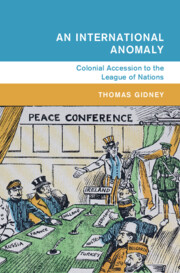Refine search
Actions for selected content:
10 results
The middling of international hierarchies
-
- Journal:
- Review of International Studies , First View
- Published online by Cambridge University Press:
- 15 August 2025, pp. 1-18
-
- Article
-
- You have access
- Open access
- HTML
- Export citation
3 - Inter Se and the League of Nations
-
- Book:
- An International Anomaly
- Published online:
- 23 March 2025
- Print publication:
- 03 April 2025, pp 105-124
-
- Chapter
-
- You have access
- Open access
- HTML
- Export citation
1 - India’s Accession to the Imperial Conference
-
- Book:
- An International Anomaly
- Published online:
- 23 March 2025
- Print publication:
- 03 April 2025, pp 25-68
-
- Chapter
-
- You have access
- Open access
- HTML
- Export citation
2 - The Formation of the League of Nations and Indian Membership ‘The Anomaly among Anomalies’
-
- Book:
- An International Anomaly
- Published online:
- 23 March 2025
- Print publication:
- 03 April 2025, pp 69-104
-
- Chapter
-
- You have access
- Open access
- HTML
- Export citation

An International Anomaly
- Colonial Accession to the League of Nations
-
- Published online:
- 23 March 2025
- Print publication:
- 03 April 2025
-
- Book
-
- You have access
- Open access
- Export citation
3 - The Magical Hour of Midnight
-
- Book:
- Struggles for Self-Determination
- Published online:
- 25 November 2021
- Print publication:
- 02 December 2021, pp 58-116
-
- Chapter
- Export citation
4 - The Collapse of Consensus and Control, 1910–1914
-
- Book:
- The Quest for Security
- Published online:
- 28 October 2019
- Print publication:
- 31 October 2019, pp 150-190
-
- Chapter
- Export citation
3 - Security, Race, and Dominion Status, 1907–1909
-
- Book:
- The Quest for Security
- Published online:
- 28 October 2019
- Print publication:
- 31 October 2019, pp 111-149
-
- Chapter
- Export citation
5 - Race, Conscription, and the Meaning of Sovereignty in War
-
- Book:
- The Quest for Security
- Published online:
- 28 October 2019
- Print publication:
- 31 October 2019, pp 191-230
-
- Chapter
- Export citation
‘Britishers and Protestants’: Protestantism and Imperial British Identities in Britain, Canada and Australia from the 1880s to the 1920s
-
- Journal:
- Studies in Church History / Volume 54 / June 2018
- Published online by Cambridge University Press:
- 14 May 2018, pp. 359-373
- Print publication:
- June 2018
-
- Article
- Export citation
